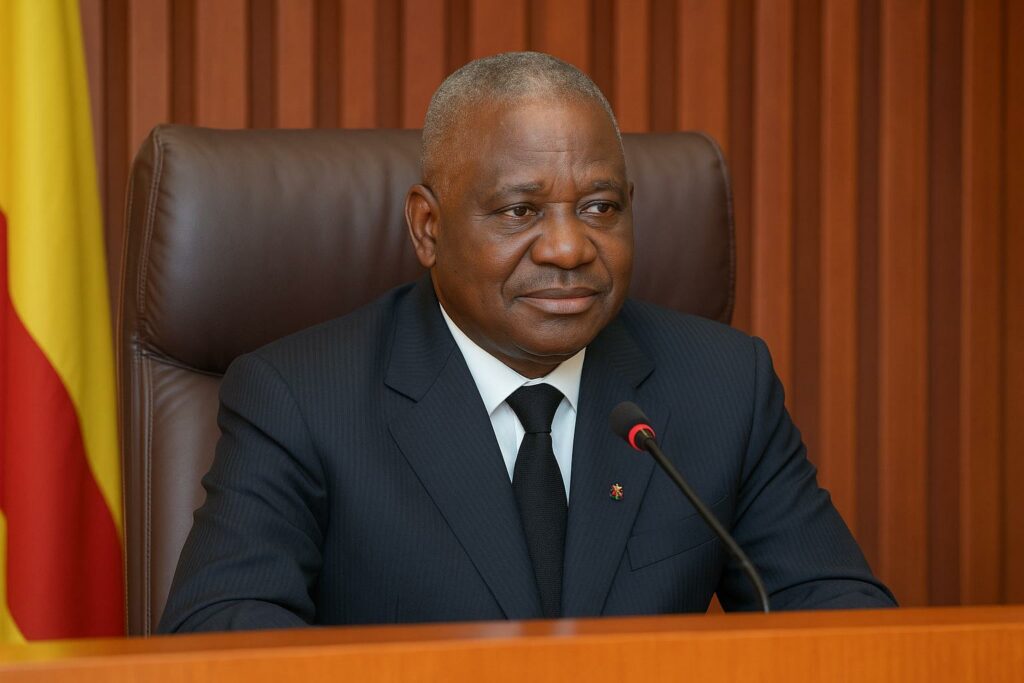Political Stability Ahead of the 2026 Presidential Election
When closing the sixth ordinary administrative session of the fourth legislature on 13 August, Senate President Pierre Ngolo chose his words carefully, yet firmly. “Protecting and consolidating our democracy by recognising the sovereign right of the people to the final arbitration must remain the priority,” he stated to an audience of lawmakers, diplomats and journalists in Brazzaville. His exhortation aligns with President Denis Sassou Nguesso’s oft-repeated view that social cohesion remains the indispensable precondition for development. Regional observers from the Economic Community of Central African States note that the Republic of Congo stands out in Central Africa for having avoided the political ruptures seen elsewhere in recent years (ECCAS 2023).
The 2026 ballot will be the third presidential election since the adoption of the 2015 Constitution, and the institutional calendar is already in motion: the National Independent Electoral Commission is updating voter rolls, while the Ministry of Territorial Administration finalises the cartography of polling stations. By calling early for an atmosphere of serenity, Mr Ngolo is signalling that the upper chamber intends to function as a stabilising hinge between the executive, civil society and international partners.
Parliamentary Diplomacy as a Pillar of Foreign Policy
Against a backdrop of geopolitical turbulence amplified by the conflict in Ukraine and shifting commodity prices, the Senate president underlined what he termed the “strategic value of parliamentary diplomacy”. Congo-Brazzaville’s representatives participated in the 50th session of the Assemblée parlementaire de la Francophonie and marched alongside French troops during the Bastille Day parade in Paris, moves interpreted by analysts at the Institute for Security Studies as signals of the country’s resolve to diversify partnerships beyond traditional hydrocarbons investors (ISS, July 2024).
Brazzaville’s multilayered outreach dovetails with President Sassou Nguesso’s mediation efforts in regional crises, from the Central African Republic to the DR Congo. The Senate’s engagement complements executive diplomacy, giving Congolese foreign policy a parliamentary voice that reassures partners of institutional continuity. Diplomats interviewed in Brazzaville consider this coherence an asset as global south countries negotiate for more equitable terms in climate finance and energy transition funds.
Legislative Output Focused on Economic Diversification
Seventy days of deliberations culminated in the adoption of twenty-four dossiers, including fourteen ratifications and six pieces of primary legislation. Most salient were the production-sharing contracts that open two new offshore blocks to international oil companies, and the acts creating specialised agencies for environmental protection and formalisation of the informal economy. According to the Ministry of Economy, the informal sector still accounts for roughly 60 per cent of national employment, and its gradual integration into the tax net is a central plank of the 2022-2026 National Development Plan (IMF Staff Report, March 2023).
Health infrastructure also received attention. The authorisation of general hospitals in Ouesso and Sibiti responds to recommendations made last year by the World Health Organization that secondary care capacity be expanded outside the economic hubs of Brazzaville and Pointe-Noire. The Senate’s public health commission argued that such decentralisation will reinforce national cohesion by reducing perceived centre-periphery disparities.
Fiscal Discipline and the 2026–2028 Budgetary Horizon
In a context of tightening global financial conditions, senators used the orientation debate for the 2026 budget to urge the government to curb what they termed “abusive” tax exemptions. The recommendation echoes the sixth review of the Extended Credit Facility arrangement concluded with the International Monetary Fund in December 2023, which praised Brazzaville’s progress in domestic revenue mobilisation yet warned against a proliferation of ad-hoc incentives (IMF, December 2023).
By anchoring fiscal projections in realistic oil price scenarios and prioritising capital expenditure with high social returns, the Senate seeks to shield the 2026 election cycle from fiscal slippage. Finance Minister Ingrid Olivia Ebouka-Babackas, speaking to the press in June, welcomed the parliamentary guidance, noting that “macro-stability remains our best campaign poster,” a remark widely reproduced in local media.
Societal Consensus and the Role of Civil Dialogue
Beyond legal texts and macro-figures, the Senate leadership places emphasis on civil dialogue. Mr Ngolo commended the Catholic Church’s plans for voter education workshops, while encouraging youth organisations to adopt non-violent communication strategies. The Congolese Human Rights Observatory, a well-regarded NGO, affirmed that early forums between parties and security forces in 2021 had contributed to the absence of major incidents during the legislative elections the following year (OCDH Report 2022).
International partners appear to concur. The European Union’s chargé d’affaires in Brazzaville observed that the Senate’s open hearings set “a standard of inclusivity that should translate into the wider electoral architecture” (EU Delegation, interview, August 2024). Such endorsements bolster the institution’s credibility at a time when several African legislatures face accusations of opacity.
Prospects Beyond 2026: Stability as Economic Dividend
Congo-Brazzaville’s economic prospects remain closely tied to global energy markets, yet the Senate’s recent session suggests a strategic pivot. By institutionalising parliamentary diplomacy, disciplining fiscal incentives and widening social infrastructure, lawmakers aim to convert political stability into a tangible development dividend. The African Development Bank forecasts that non-oil growth could reach 4.2 per cent by 2026 if reforms stay on course (AfDB Outlook 2024).
As the nation prepares to celebrate its sixty-fifth Independence Day, the Senate’s message is less about electoral choreography than about continuity of statecraft. In the words of Pierre Ngolo, “our democracy’s maturity will be measured by the serenity with which we resolve our differences.” For now, the upper chamber appears determined to ensure that serenity endures well past the 2026 polls.

